 FILM
FILM « In Which Black Swan Trumpets Disaster »
 Friday, December 3, 2010 at 10:34AM
Friday, December 3, 2010 at 10:34AM 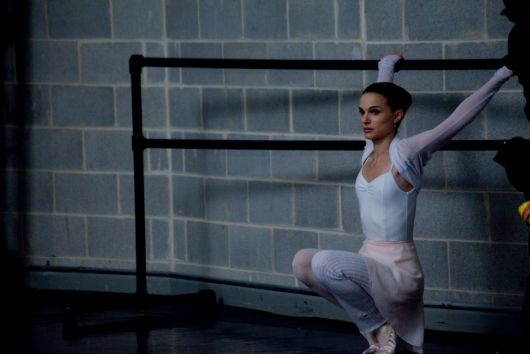
Tortured Dancer
by DURGA CHEW-BOSE
dir. Darren Aronofsky
107 minutes
Darren Aronofsky’s psychological thriller, Black Swan, is a cannonade of ballet’s absolutes turned burlesque. Like a self-doubting teenager who applies too much make-up or wears too much jewelry, the film piles on element after element and never once — despite its patent mirror motif — stops to consider its own reflection. In a world where precision wears the crown, Aronofsky’s cumulative fanaticism feels unwieldy.
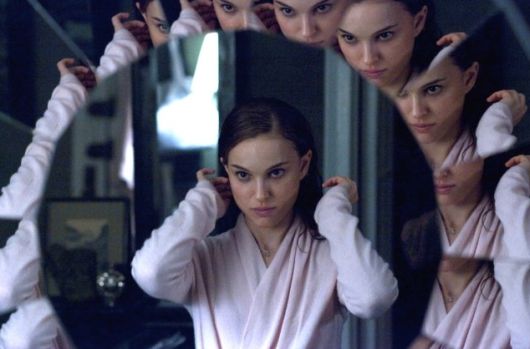
Nina Sayers (Natalie Portman) is a tortured young dancer whose reach for perfection as lead in Swan Lake results in her fatal undoing. Delusive eruptions of anger and suspicion, fright and mutilation, pilot her to the end without ever establishing reality or any basis for comparison. The entire film is a cold sweat panic attack that wobbles cartoonishly under a score of clichés — a devoted and despotic former ballerina mother (Barbara Hershey) who paints nightmarish portraits of her daughter, Nina’s infantilized Capezio pink and plush toy bedroom, a doppelganger dancer, Lily (Mila Kunis), whose drugs, tattoos, drinking, and sex life tempt and thieve, and the company director, Thomas Leroy (Vincent Cassel), whose “Attack it! Attack it!” method of teaching is sexed up with adages on “losing yourself” and “letting go” in order to become “transcendent.”
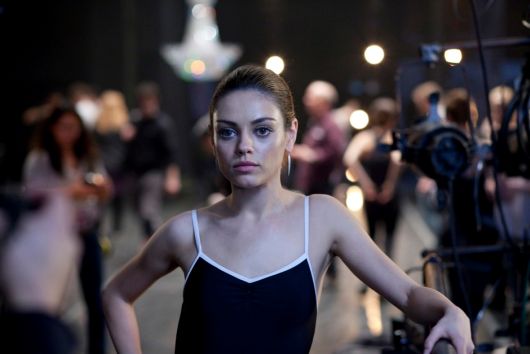
At first Portman’s performance as Nina is fascinating because her initial calm is almost macabre. As tokens of imminent craze begin to surface — jealousy from other dancers, stress rashes, a ripped toenail while practicing her thirty-two fouettés — the prospect of a diametric character becomes exciting. But Portman doesn’t break from the mould. She is the stereotype of a strained dancer, taut to the point of tears or possessed in a spate of delirium. No layer of warm-up shrugs or pastel legwarmers can hide overwrought, flinty intensity.
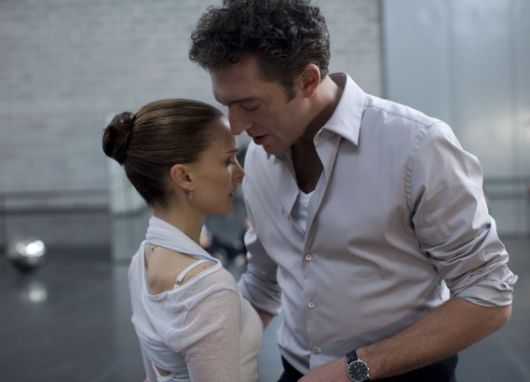
Like years of corset tightlacing, her entire face recedes into her fixed bun; even her eyebrows appear pinned. Her performance reaches its ceiling and remains there. And like so many thrillers that misfire, the camera ceaselessly orbits and stalks her every move; Portman’s Nina spends the majority of the movie trapped in what might as well be a hermetic maze of eternal mirrors.
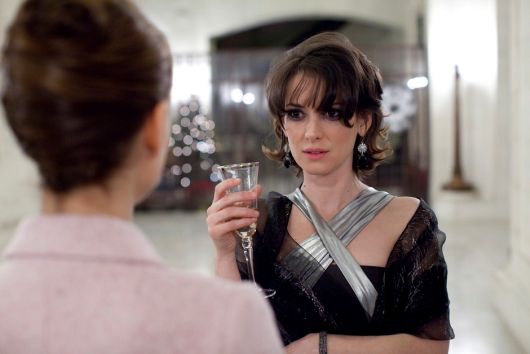
While there are moments of stunning beauty, indelible is not a word that comes to mind. Ashen skin set against total darkness is contrast and nothing more. Music that bullies instead of chaperones is not moving, it’s simply too loud. A girl in a delicate white gown can so easily look like a girl in a nightgown. Rare are the moments where Black Swan takes off, and en masse, it’s the props that are deserving of praise. Like the celebratory cake, a gift from mother to daughter. Replete with bright pink edible flowers, lustre dust, and royal icing, it looks sickeningly sweet and under no circumstance would a dancer consider even one slice. The cake — so ridiculous and ornate like a Havisham relic — both mocks and infantilizes Nina. It’s the most heartbreaking and in some ways creepiest cake ever. A perfect prop!
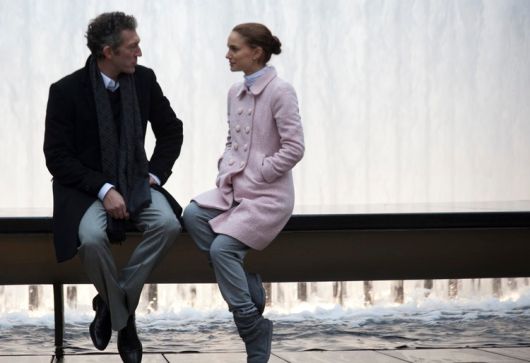
Ballet in film indulges some of our guiltiest pleasures: drama is at its highest concentration, the pursuit of perfection is infinite, rivalry is both tacit and public, company hierarchy breeds paranoia, discipline breeds mania, and the dancer’s lissom body — a complex and almost cruel layering of muscles and bones, a miniature torso, a long neck — is impossible to ignore. With that in mind, some of the worst ballet films are in fact some of the best ballet films. We pander to their production because like CIA thrillers— cover-ups, classified files, lampooned conspiracies — ballet’s backstage can be similarly entertaining. Both genres are met with “It’s what you’d expect” approval and recommendation, and some even garner cult status.
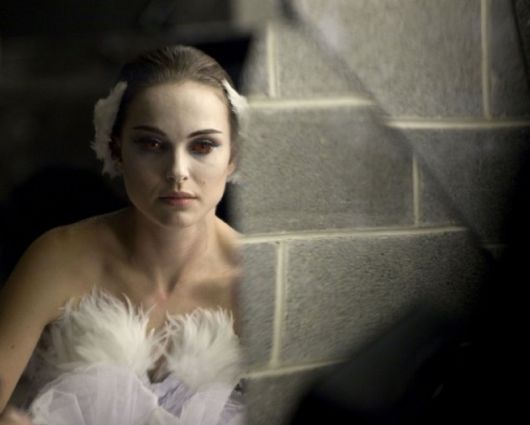
So why isn’t Black Swan one of those terrible but wonderful ballet films? And what does it take to make a great ballet film a great ballet film? A central love story? A repellent but ultimately well-meaning impresario? Real soloists as lead characters? Or perhaps no lead characters at all? Is it a question of proportions? An even ratio of clichés to nuance? For every scene where she can’t eke out a perfect turnout, count one where she can let loose at a downtown walk-in class. For every question, another question?: “Why do you want to dance?” “Why do you want to live?”
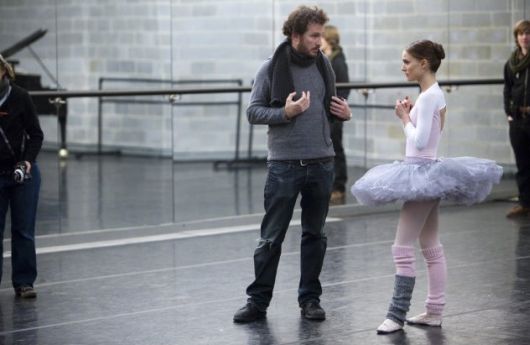
That final example references the greatest ballet film: Powell and Pressburger’s 1948 The Red Shoes. In its climactic seventeen minute ballet of the same name, the most hallucinatory fantasia of optics and illusion dissolves the stage’s limitations into a celluloid nightmare. Likewise, the stage’s presence—its design, its costumes, the validity of live audience — imparts a physical power to the camera. Two art forms that are typically at odds converge. The ballet of The Red Shoes within the film displays the most harrowing commitment to art; a plenary account that Black Swan tries too hard to attain and ultimately misses entirely.
Durga Chew-Bose is the senior editor of This Recording. She is a writer living in Brooklyn. She tumbls here and twitters here.
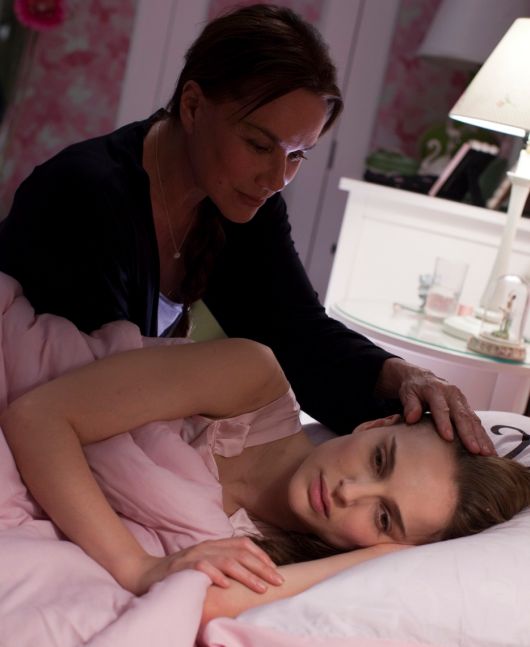
"My House" - Hercules & Love Affair (mp3)
"Athene" - Hercules & Love Affair (mp3)
"Blind (Frankie Knuckles remix)" - Hercules & Love Affair (mp3)
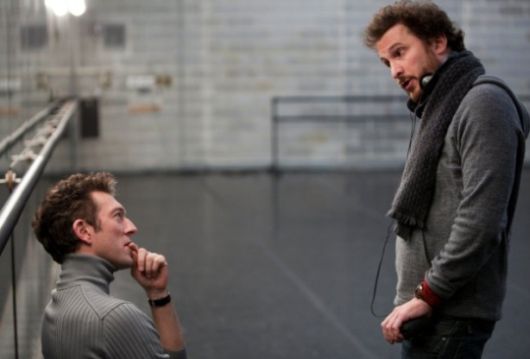






























Reader Comments (5)
So... does this mean this film is or isn't a great candidate for my film series: Happy Hour at PF Changs and a Movie? I can't tell! (The first was Burlesque, which was a failure, of course.)
there's no "stress rash" - she's the Ultimate Cutter.
as well as bulimic.
every moment of puking/cutting/picking/skin & face distortion/self destructive behavior is a scene depicting her battle with herself - i.e., she makes herself throw up and then walks out of stall to see mirror scrawled with "whore"
she hates herself and that's who she is fighting the whole way through.
this movie is not so much about ballet, even, as it is about the often tortured relationship we have with ourselves. how we can be our own worst enemy.
so we look for others to validate us, somehow see us differently than we see ourselves, consider us or our actions/(in this case, ballet performance) "perfect" ...despite how imperfect we know ourselves to be.
if only we could get others to see us as who we want to be, instead of who we know we actually are... wouldn't that be fantastical?
of course that's a distorted fantasy and an absolute impossibility, which is how you can predict the ending to this movie right from the beginning... and also explains some of the more garish, obvious, exaggerated filmmaking.
as nyorker review pointed out, arnofsky's films are ultimately about self-destruction...the wrestler closes on a similar note to black swan.
i became further convinced when I read that swan lake itself is actually often told as more of a romeo and juliet story than just a juliet story: http://en.wikipedia.org/wiki/Swan_Lake#Synopsis
so it seems like he was going for a certain message, maybe.
you're right about the music, that was a good line.
He needs to be permanently separated from the music of Clint Mansell with a restraining order.
"creepiest cake ever" truuuuuuu